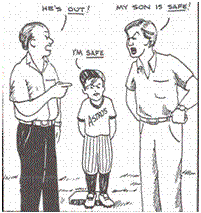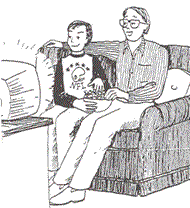HOW SPORTS CAN HELP YOUR CHILDREN ACHIEVE
sports are the most important valueable part of life for youngers, students,olders, elders, parents ect. Sports activities and interests provide many positive opportunities for children. However, they can also cause some problems. Many parents believe that participation in sports will enhance children's school accomplishments, while others believe that sports get in the way of their children's achievement. Whether they help or distract from achievement depends on the extent of children's involvement and the type of experiences they have.SPORTS GENERALIZES TO ACHIEVEMENT
Good sportsmanship provides guidelines that can be
generalized to classroom and lifelong achievement. Participation in
challenging sports contests teaches children to love classroom
challenge. It also teaches children to function in a competitive
society.
The world of sports
mirrors how one can play the game of school and life. Good athletes
stay in the game and play their best even when they are losing. They
know they will win some and lose some. They discipline themselves. They
practice with grueling regularity the necessary skills for their sport.
Education, life accomplishments, creative contributions in the arts,
sciences, business, and government involve similar perseverance and
self-discipline.
Our society
is competitive, and we should teach our children to function in
competition and how to both win and lose as good sports. Children must
learn that winning and losing are both temporary, and that they can't
give up or quit. Learning to become a team player is also important for
children who may prefer to be the center of attention.
If
kids who come to my clinic are involved in sports, I often ask them to
interpret their underachievement using the rules they would use in the
sport in which they participate as guidelines. They can always come up
with some good advice for themselves based on their understanding of
good sportsmanship. Encouraging follow-through and self- discipline for
their achievement may, however, be more difficult than their
acknowledging what they should do.
KIDS BUILD CONFIDENCE AND HAVE FUN
Some children are natural athletes
while others have lesser physical coordination. Sports and athletic
activity are good for building confidence for both groups. For the well
coordinated, the discipline of honing skills gives a sense of
improvement and accomplishment. Winning games and moving to higher
levels of competition permit these children to sense their personal
progress.
Children
with lesser coordination need to begin involvement in less competitive
sports at first or in activities in which they can achieve improvement
compared to past accomplishments (personal best) to measure their own
growth. Playing at B or C levels or on intramural teams at recreational
departments and community centers permits them some winning experiences
and lets them know that despite the unlikelihood of their excellence,
they can not only improve their competency, but can also thoroughly
enjoy the fun of sports and competition.
 Many young people have actually found themselves much more skilled than
they or their parents dreamed because they took the risk of practicing
what appeared to be their lesser skills. Sports has often resulted in
fun for even those who never dunked a basketball or hit a home run. The
Special Olympics, which takes place nationally for children with
special needs, is an extraordinary example of children who often have
extreme handicaps enjoying the benefits of athletics.
Many young people have actually found themselves much more skilled than
they or their parents dreamed because they took the risk of practicing
what appeared to be their lesser skills. Sports has often resulted in
fun for even those who never dunked a basketball or hit a home run. The
Special Olympics, which takes place nationally for children with
special needs, is an extraordinary example of children who often have
extreme handicaps enjoying the benefits of athletics.
 Many young people have actually found themselves much more skilled than
they or their parents dreamed because they took the risk of practicing
what appeared to be their lesser skills. Sports has often resulted in
fun for even those who never dunked a basketball or hit a home run. The
Special Olympics, which takes place nationally for children with
special needs, is an extraordinary example of children who often have
extreme handicaps enjoying the benefits of athletics.
Many young people have actually found themselves much more skilled than
they or their parents dreamed because they took the risk of practicing
what appeared to be their lesser skills. Sports has often resulted in
fun for even those who never dunked a basketball or hit a home run. The
Special Olympics, which takes place nationally for children with
special needs, is an extraordinary example of children who often have
extreme handicaps enjoying the benefits of athletics.SPORTS ARE FOR GIRLS TOO
The domain of sports has for a long time belonged mainly to males. With
so much to be learned from sports, it is surely unfair to reserve that
opportunity only for boys. Female teams now abound in many schools and
communities. Forty percent of the basketball teams in schools are now
girls' teams. Girls' participation in sports should increase their
confidence, risk taking, and their ability to function in competition.
Girls' lesser experience in sports, compared to boys, may underlie some
of the career problems women cope with in business, industry, science,
or the arts, where the rules of team sports often prevail.
KIDS LEARN THROUGH WATCHING GAMES
Whether kids watch sports games in
ball parks, arenas, or on TV, they have opportunities for learning much
that can positively affect school and lifelong achievement.
Mathematical concepts related to scoring such as football yardages,
baseball averages, and bowling scores, and spatial skills that come
from sports activities, are automatically learned by observation. This
is especially important for girls who tend to have more problems with
mathematics and spatial abilities.
Hopefully,
children are learning the rules of good sportsmanship vicariously as
they watch the attitudes of their parents or professional players when
they are victorious or when they lose. I emphasize "hopefully" because,
unfortunately, some professional and college players, and even some
parents model, just the opposite. The same can be said about sports
figures who serve as role models. Although some encourage children to
achieve, others are role models for magical thinking and even immoral
behavior. Still others promote very expensive shoes and clothes the
kids think they "can't live without." Parents should help children
interpret appropriate attitudes and sportsmanship.
 Viewing
games together often facilitates the emotional bonding of sons with
their dads, which is especially important for developing male self-
confidence. When boys have poor social skills, I often recommend that
they watch some sports on TV. It permits them to learn the sports
language that allows spontaneous conversation and acceptance by other
boys. Although I don't expect all kids to develop enthusiasm for
sports, a few choice words and scores eases them into comfortable
acceptance by other kids.
Viewing
games together often facilitates the emotional bonding of sons with
their dads, which is especially important for developing male self-
confidence. When boys have poor social skills, I often recommend that
they watch some sports on TV. It permits them to learn the sports
language that allows spontaneous conversation and acceptance by other
boys. Although I don't expect all kids to develop enthusiasm for
sports, a few choice words and scores eases them into comfortable
acceptance by other kids.SPORTS CAN BE TOO MUCH OF A GOOD THING
Involvement in sports causes problems for kids
mainly when it becomes "too much of a good thing." When sports
participation is prioritized as more important than learning by either
parent, or when children spend too much of their time watching sports
on TV, little time is left to develop academic competence or other
interests. When kids assume they can become professional athletes
without a realistic sense of the skill and practice required or the
competition they'll meet, they give up learning and close doors to
other opportunities for themselves. When sports are enjoyed in a
balanced way and do not take over children's lives, they have great
potential for making contributions to lifelong achievement.
As
with most other interests, if sports dominate children's lives,
children may be prevented from accomplishing more important goals.
Gifted athletes should also prepare themselves for alternative
opportunities. Incredible competition and unpredictable physical
injuries can prevent even the most talented athletes from enjoying the
career of their choice.

No comments:
Post a Comment